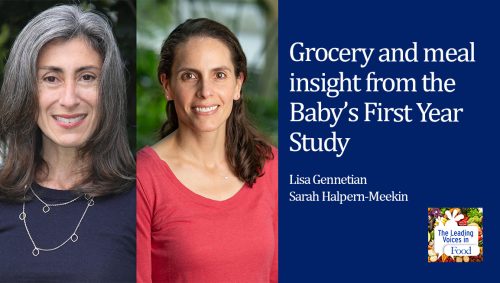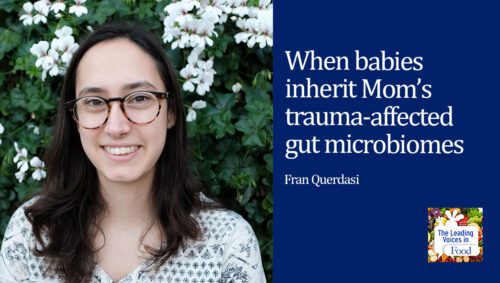The Leading Voices in Food
E115: How Precision Diet Might Overcome Some Genetic Roadblocks
Could there come a day when an optimal diet could be recommended not just for the population overall or for people with special conditions such as diabetes but a diet that would be unique for you? A diet based on your genetics let’s say on the condition of your microbiome perhaps? Or on your environmental exposures or other factors? This futuristic possibility may be closer than you think. Thanks to the work of researchers, including today’s guest Dr. Steven Zeisel, Director of the Nutrition Research Institute and Director of the Nutrition Obesity Research Center at the University of North Carolina.
Subscribe: Apple Podcasts | TuneIN | Google Podcasts | SoundCloud | PocketCasts | Radio Public
Tags: Diet & Nutrition | Microbiome |

Dr. Zeisel and his research team focus on the essential nutrient choline and why there are individual differences in nutrient metabolism, using new approaches in nutrigenomics and in metabolomics. The team works with humans, mice and cell culture model systems. Using our human studies we discovered that there are very common single nucleotide polymorphisms (SNPs; gene misspellings) that make humans require more dietary choline and that one of these is in the gene PEMT and prevents estrogen from inducing the gene. We are collaborating in a number of epidemiology studies that examine the relationship between diet, these gene SNPs, and risk for disease. After identifying a SNP of interest in humans we make a mouse model and now have three such knockouts. One of them develops mitochondrial abnormalities and has immotile sperm. We are conducting studies in humans on this SNP. In another study, we examine choline’s role in brain development and discovered that choline is critical for cortical and hippocampal development. We study mouse models and neural progenitor cells in culture to identify the molecular mechanism for choline’s effect on brain.
Interview Summary
I would like to lead off by asking what you mean when you use the term precision nutrition.
Precision nutrition is really the use of modern day science to be more precise about our recommendations for any given individual. In the last decade, we’ve realized that people vary greatly in their metabolism and many people have roadblocks that certain steps of metabolism.
How far along is the science with this?
Well, I think that in terms of the roles of genetic misspellings on your metabolism, we’re really quite far along. Now when I say gene misspelling, each of us has a genetic code and it’s constructed of four letters. We inherit our genes from our ancient ancestors and during many thousands of years we have developed alternative spellings in some of the genes I’m going to call the misspellings called SNPs. And these alternative spellings sometimes are in genes that are critical for steps in metabolism and cause us to be more or less efficient at the steps.
Steve, can you give us an example, perhaps even a hypothetical one, of how such information might get harnessed in order to help a certain person? Would a person have a biological deficiency in some way that could be learned from genetic tests that then could be turned into recommendations for specific foods?
Yes, so again from my own research on the nutrient choline – choline is really important during pregnancy to build a healthy baby with optimal brain function. Women were designed to be able to turn on the production of choline in their liver when estrogen levels the hormone that rises markedly during pregnancy. When estrogen rises, they turn on their production to make this choline and therefore are less dependent on their diet. And what we’ve discovered is that women who come European backgrounds have very commonly a misspelling in the gene that needs to be turned on and the switch for estrogen isn’t working right. And so they like men don’t turn on this gene. And this is really important because these are the women who have to be really careful about getting a good source of this nutrient during pregnancy, because they don’t have the backup insurance of being able to make it by themselves
There are other things like environmental exposures that might lead to specific nutrition recommendations for particular individuals, or maybe the condition of the microbiome, what other sort of factors might be relevant other than just pure genetics?
Genetics is the most ready to go to market because we know so much about these tools but we differ in our metabolism for other reasons than having genetic mistakes. For instance, our microbiome, which are the bacteria and fungi and other microbes that live in our gut sees our food often before we do. And if you have a microbiome that is destroying some of the nutrients you need then you have to eat more in your diet. Alternatively, the microbiome can make some of the nutrients that you need. For instance, vitamin K very important for normal blood clotting, vitamin K is made by the microbiome as is folate. And if your microbiome isn’t working well to make it then you must eat more in your diet. Microbiome is another area in which people can differ and that can make them need more or less of other nutrients. Environment probably also can change your requirements. We know for instance that there are environmental agents that emulate, simulate, exposure to estrogen and this can change genes that depend on estrogen and thereby change metabolism. And other foods you eat obviously can be manipulating your metabolism. Grapefruit changes the metabolism of many drugs because it turns on the liver’s metabolism system. And what is changing drug metabolism is likely also changing metabolism of the normal components of food that these systems were meant to degrade and excrete.
So this work is very sophisticated and extremely interesting and promising. How do you see as commercial applications for this kind of work?
Right now, on the market, there are a number of gene tests for instance that tell you how fast you metabolize a component of your diet caffeine and there are fast metabolizers and slow metabolizers and it turns out that the fast metabolizers chew up caffeine quickly and therefore the person has to stand in line the coffee shop to get a second coffee while the slow metabolizers after drinking some coffee keep their caffeine levels up for a longer time and don’t crave more caffeine so rapidly. That’s an example of a gene test you can have to find out if you’re a fast or slow metabolizer of caffeine. Of course, most of us know that by how much shaking we do as we stand online at the coffee shop.
So let’s turn back to the issue you mentioned earlier, your own work on choline. So you mentioned that it was particularly important during pregnancy. Is it important other times of life let’s say for children?
Kelly when I started out in my science career we thought that people didn’t require choline in the diet, all the textbooks said that. And in fact, we weren’t giving it to people when we fed them intravenously in the hospital and those people got sick. And when I first started out, I thought it was strange that animals required choline in their diet, but people didn’t. And so I put people in the hospital, I took choline away and what I discovered was is that most men and most post-menopausal women when deprived of choline developed liver problems, fatty liver and liver damage or develop muscle problems with breakdown of their muscles. And I found that premenopausal women in North Carolina, only about a little less than half of them got sick when deprived of choline. And so choline is really important for maintaining normal liver function and for maintaining your muscle. The premenopausal women that got sick all had gene misspellings that made them unable to turn on choline formation in their liver with estrogen. And so they were reduced to the sad state of men and had to eat choline in their diets at all times or get sick. So that work prove that humans required choline and it led to a recommendation by the US National Academies of Science that all humans get it and we set dietary requirements which are now on food labels. People should eat half a gram of choline a day and as adults a little more when you’re pregnant because you use a lot of choline to deliver it to the baby. The choline is used to build a baby’s membranes that surround their cells and to build and drive normal development of the brain.
What foods provide choline?
Choline is found in fatty foods often that also contain cholesterol, it’s in the membranes of the foods. So eggs and meats are excellent sources of choline. Plant-based sources are harder to find and you have to choose those plants sources that have lots of membranes like wheat bran. For people who want to find out what foods that they eat are the best for getting choline, the US Department of Agriculture maintains a database with thousands of foods in it and tells you what the choline content of those foods are.
In the 1970s and ’80s we recommended that everybody cut back cholesterol in their diet to prevent heart disease. The bad part is that we thought we were very smart as nutritionists and nutrition scientist when we did that. But we also cut back choline in the diet without knowing about it. We discouraged people from eating foods with it. And now choline intake is a problem nutrient in the United States. And every year the US government conducts a national health and nutrition survey, and they find only 7% of women who are a pregnancy age are eating the recommended intake of choline and at least a quarter are eating half the recommended and that’s true for men. The only group that seems to be eating an adequate amount of choline are young children who are drinking lots of milk.
You mentioned muscle function. Could you tell us more?
So in the adults, when they’re deprived of choline about 10% of people develop breakdown to their muscles every time they exercise. And we see that by looking at an enzyme that’s released from muscle into blood when the muscle breaks down. This breakdown can be quite severe in some people who were fed a low choline diet. And we find that all of these people have a genetic of variance spelling difference in the gene that transports choline into the muscle cell and in the gene that first uses choline to make the products needed to help the muscle function normal. We can do a genetic test, predict who those people are and when we feed them adequate amounts of choline they do not break down their muscle when they exercise. And this has been of interest in the armed forces where they find that up to 25% of war fighters who are in training have to stop training because muscle breakdown is excessive. And they are wondering whether some of this breakdown is due to these people who have this genetic difference and a higher need for choline.
So thinking of the general public, are there groups of people do you think it would make sense from a public health point of view to be tested for choline and how would people know what their optimal levels are? What would you see happening with that?
I think that in women who are going to get pregnant, who are pregnant, where choline is so important for building a normal baby’s brain. In mouse models we can show that the stem cells that are going to form the nerves within the brain, don’t divide properly if choline isn’t available at a critical time during pregnancy. And the mouse baby is born with many fewer nerve cells in their brain and don’t function as well. They are worse at running mazes and at doing cognitive testing. In humans, a group at Harvard School of Public Health looked at women’s intake during the first and second trimester of pregnancy and found that women in the lowest choline intake versus women in the highest intake when their children are studied at seven years of age for how well their brain performs cognitive function they find that the women in the lowest intake had children who perform worse at seven years of age than women in the highest intake. In addition, neural tube defects and other birth defects that are fairly common during pregnancy increase among the children of women who were on the lower choline intake. And in a study in Berkeley, California they reported that these neural tube defects, defects of formation of the spinal cord and brain were increased fourth fold in the women who were in the lowest group for intake of choline and this is after correcting for the vitamin folic acid that we know is so important during pregnancy as well. Women during pregnancy I think should have a test looking for these gene differences. And if they have them they should eat a diet more carefully that contains foods that are rich in choline. Because such a test is not been available, I work with a company that’s trying to spin out a gene test. We also are working on fatty liver. About a third of the population in the United States as they gain more weight, develop excess fat in their liver that seems to interfere with how they use insulin and makes them insensitive to insulin and this is called metabolic syndrome. And again, people when deprived of choline developed fatty liver, and we find that this is because they have a problem sending fat outside of the liver to feed the other organs in the body. And so fat packs up in the liver whenever they make more of it because they’re slow to mail the fat out of the liver. And this is related to having trouble making the envelope needed to mail the fat from the liver because that envelope is made of a choline and some other constituents. And so people deprived of choline develop this, people who have metabolic roadblocks in the metabolism of choline and related nutrients have the same roadblock and problems in exporting fat. And when they gain weight they develop fatty liver more rapidly. We’re hoping to develop a genetic test that identifies who these people are and then we can give the nutrients beyond their roadblocks and metabolism and try to return them to normal.






